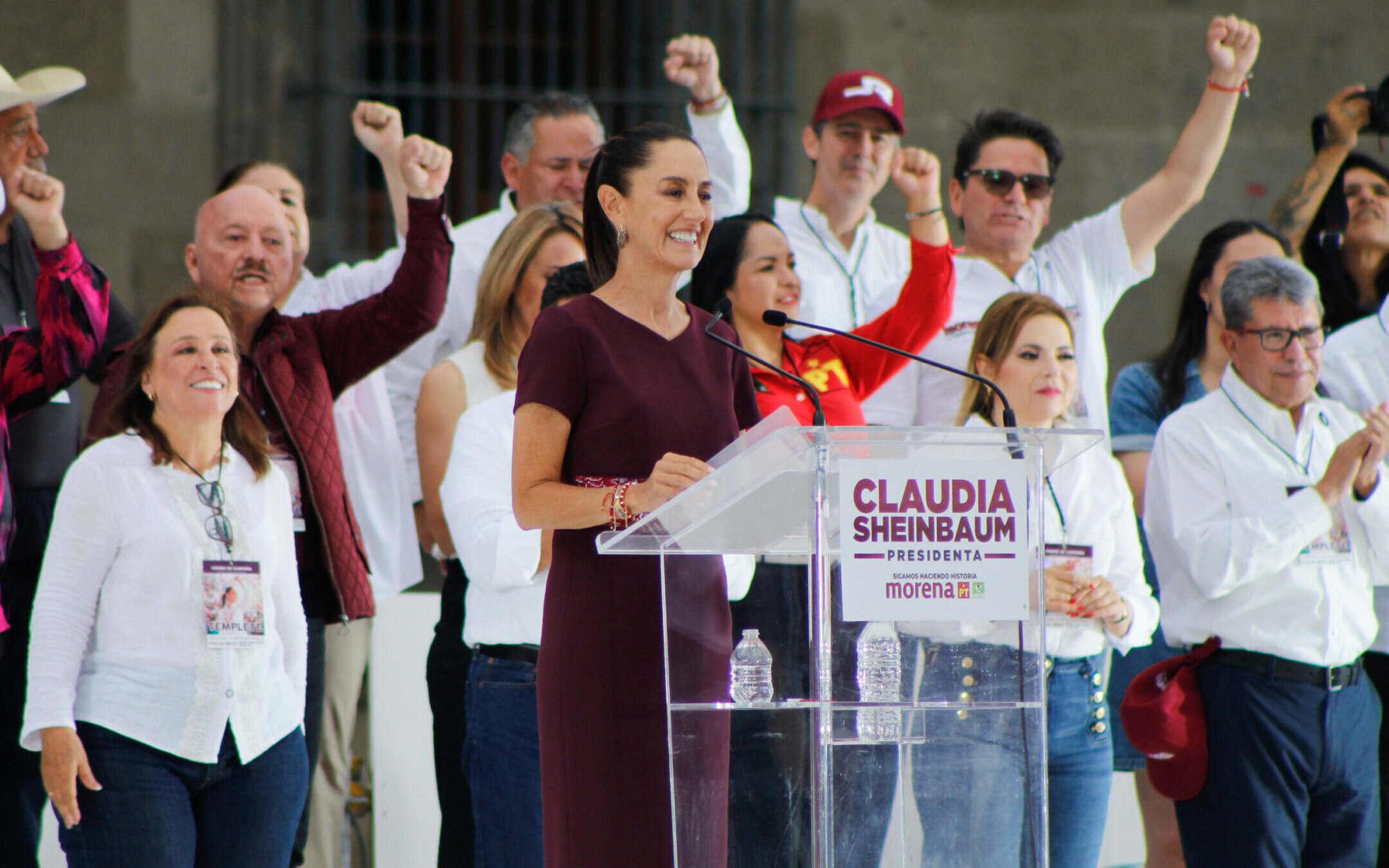Jewish liberal Claudia Sheinbaum likely to win this week’s Mexican presidential election, polls show
If Claudia Sheinbaum wins Mexico would become the largest country by far to have a head of state with a Jewish background

Mexican presidential candidate Claudia Sheinbaum speaks during the 2024 closing campaign event in Mexico City, Mexico, May 29, 2024. (Brigette Reyes/ObturadorMX/Getty Images)
Claudia Sheinbaum vaulted to the top of the Mexican presidential polls last year when she was selected as the candidate for the left-wing Morena party, which has been led by the country’s popular outgoing president, Andrés Manuel López Obrador.
Now, with the election days away, Sheinbaum’s lead over Xóchitl Gálvez, her center-right opponent, has only widened — making it even more likely that the country will elect both its first woman president and the first leader from a Jewish family.
With a population of 127 million, Mexico would become the largest country by far to have a head of state with a Jewish background.
A former mayor of Mexico City, Sheinbaum is a respected scientist and political liberal who has taken credit for beating back crime. Unlike López Obrador, she comes from an affluent family, has lived in the United States and speaks English fluently. But she has been his political protege for decades, and her candidacy is widely understood as a way to extend his popular policies even though Mexico limits presidents to one term.
Sheinbaum’s Jewish background has barely come up on the campaign trail. But she has always been open about her family’s story: Sheinbaum had Ashkenazi grandparents who immigrated from Lithuania in the 1920s and Sephardic grandparents who left Sofia, Bulgaria, in the 1940s to escape the Holocaust. She has said that she celebrated holidays at her grandparents’ houses, but at home with her political activist parents, her family life was secular.
Home to an estimated 50,000 Jews, Mexico is known for having multiple tight-knit Jewish communities, many of which don’t mingle much. Sheinbaum — who married her second husband, Jesús María Tarriba, in November — is not part of any of them.
“She’s not seen as, let’s say, one of us,” Daniel Fainstein, the dean of Jewish Studies at the Hebraica University in Mexico City, told the Jewish Telegraphic Agency last year. “I think that she’s seen as someone from Jewish origins that is developing her work as an academician and then as a politician.”
More recently, Tessy Schlosser, director of the Jewish Documentation and Research Center of Mexico, told the Associated Press that Sheinbaum’s identity is clear within the local Jewish community. “Claudia has actively tried to say: ‘This is not me,” she said. “It must be respected when a person does not want to be identified in one way or another.”
Some of Sheinbaum’s detractors have invoked her Jewish background, including former President Vicente Fox, who called her a “Bulgarian Jew” in an apparent attempt to minimize her candidacy. He apologized, but made a similar comment after Sheinbaum briefly donned a rosary with a crucifix after being given one during a campaign stop last fall. “JEWISH AND FOREIGN AT THE SAME TIME,” Fox tweeted. Sheinbaum has produced her birth certificate multiple times to dispel rumors that she was born in Bulgaria.
“What has been said about Claudia Sheinbaum on some occasions is very close to antisemitism,” Juan Pablo Pardo-Guerra, a Mexican sociologist at the University of California San Diego, told JTA last year.
Those attacks have done little to slow Sheinbaum’s rise to power in a country where an estimated 80% of people identify as Catholic. “As a Mexican of Jewish origin, I have seen with amazement and optimism how so many Mexicans, in a predominantly Catholic country, are backing someone of her gender and religious origin,” the academic Ilan Stavans wrote in the New York Times in March.
Among the most pressing challenges facing Mexico’s next president are crime, energy policy and managing its northern border with the United States. The president will also have a chance to decide whether to follow through with Lopez Obrador’s past promise to recognize an independent Palestine, a symbolic move that more than 140 countries have already made.
Sheinbaum has not commented publicly on the issue, even as pro-Palestinian sentiment has strengthened in Mexico, home to about as many Palestinians as Jews, during the current Israel-Hamas war. (The country is home to an estimated 30,000 Palestinians; pro-Palestinian protesters set fire outside the Israeli embassy in Mexico City this week.)
But she has previously put a stance on the record about Israeli military action in Gaza — in a letter to the editor of La Jornada, a major Mexico City newspaper, in January 2009, when she was a professor and Israel and Gaza were locked in what would ultimately be a three-week war. In it, she cited her Jewish background in making an argument that could apply just as easily today.
“Because of my Jewish origin, because of my love for Mexico and because I feel like a citizen of the world, I share with millions the desire for justice, equality, fraternity and peace, and therefore, I can only see with horror the images of the state bombings,” she wrote at the time, adding, “No reason justifies the murder of Palestinian civilians … Nothing, nothing, nothing, can justify the murder of a child.”
This article originally appeared on JTA.org.












